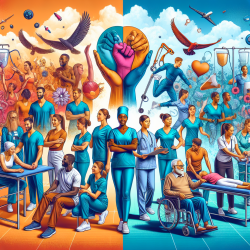The research article "Perspectives on cerebral palsy in Africa: Exploring the literature through the lens of the International Classification of Functioning, Disability and Health" by Abdel Malek et al. (2020) provides valuable insights for practitioners aiming to improve their skills in managing cerebral palsy (CP) in resource-limited settings. This blog post will highlight key findings from the study and offer actionable recommendations for practitioners to implement these outcomes in their practice.
Key Findings
The study reviewed 27 articles on CP in African countries, revealing several important trends:
- Most studies (70.3%) were quantitative and focused on children or caregivers.
- The majority of research included a body functions and structures component (70.4%), focusing on impairment rather than functioning.
- Activities and participation domains were often limited to mobility.
- Environmental factors typically related to resources and policies, while personal factors were often unexplored.
Recommendations for Practitioners
Based on these findings, practitioners can take several steps to enhance their practice:
1. Adopt a Holistic Approach
While the majority of studies focus on impairments, it's crucial to consider the broader context of a child's life. The International Classification of Functioning, Disability and Health (ICF) framework encourages a holistic approach that includes:
- Body Functions and Structures: Assess and address physical impairments.
- Activities and Participation: Promote participation in daily activities and social interactions.
- Environmental Factors: Consider the impact of resources, policies, and social attitudes.
- Personal Factors: Acknowledge individual characteristics such as motivation and coping strategies.
2. Focus on Modifiable Factors
Practitioners should target modifiable factors that can improve outcomes for children with CP. These include:
- Enhancing mobility through physical therapy and assistive devices.
- Improving access to education and community programs.
- Advocating for policy changes that support children with disabilities.
3. Engage in Knowledge Translation
Knowledge translation activities are essential to bridge the gap between research and practice. Practitioners can:
- Participate in professional development opportunities.
- Collaborate with researchers to stay updated on the latest findings.
- Share knowledge with colleagues and stakeholders to promote best practices.
4. Encourage Further Research
The study highlights the need for more research on CP in Africa, particularly in areas such as:
- Environmental and personal factors affecting children with CP.
- Interventions that address participation and quality of life.
- Longitudinal studies to track outcomes over time.
Practitioners can contribute to this effort by documenting their experiences and outcomes, and by participating in research initiatives.
Conclusion
The research by Abdel Malek et al. (2020) underscores the importance of adopting a comprehensive, ICF-based approach to managing cerebral palsy in Africa. By focusing on holistic care, targeting modifiable factors, engaging in knowledge translation, and encouraging further research, practitioners can significantly improve outcomes for children with CP.
To read the original research paper, please follow this link: Perspectives on cerebral palsy in Africa: Exploring the literature through the lens of the International Classification of Functioning, Disability and Health.










